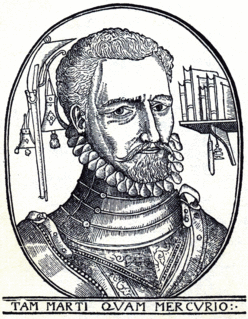Related Research Articles

Torquato Tasso was an Italian poet of the 16th century, known for his poem Gerusalemme liberata, in which he depicts a highly imaginative version of the combats between Christians and Muslims at the end of the First Crusade, during the Siege of Jerusalem.
This article presents lists of literary events and publications in the 16th century.
This article contains information about the literary events and publications of 1587.
This article contains information about the literary events and publications of 1577.
This article contains information about the literary events and publications of 1565.
This article contains information about the literary events and publications of 1520.
This article contains information about the literary events and publications of 1506.

George Gascoigne was an English poet, soldier and unsuccessful courtier. He is considered the most important poet of the early Elizabethan era, following Sir Thomas Wyatt and Henry Howard, Earl of Surrey and leading to the emergence of Philip Sidney. He was the first poet to deify Queen Elizabeth I, in effect establishing her cult as a virgin goddess married to her kingdom and subjects. His most noted works include A Discourse of the Adventures of Master FJ (1573), an account of courtly intrigue and one of the earliest English prose fictions; The Supposes,, an early translation of Ariosto and the first comedy written in English prose, which was used by Shakespeare as a source for The Taming of the Shrew; the frequently anthologised short poem "Gascoignes wodmanship" (1573) and "Certayne Notes of Instruction concerning the making of verse or ryme in English" (1575), the first essay on English versification.

Aminta is a play written by Torquato Tasso in 1573, represented during a garden party at the court of Ferrara. Both the actors and the public were noble persons living at the Court, who could understand subtle allusions the poet made to that style of life, in contrast with the life of shepherds, represented in an idyllic way.
Nationality words link to articles with information on the nation's poetry or literature.
Nationality words link to articles with information on the nation's poetry or literature.
Nationality words link to articles with information on the nation's poetry or literature.
Nationality words link to articles with information on the nation's poetry or literature.
Nationality words link to articles with information on the nation's poetry or literature.
Nationality words link to articles with information on the nation's poetry or literature.
Nationality words link to articles with information on the nation's poetry or literature.
Nationality words link to articles with information on the nation's poetry or literature.
Nationality words link to articles with information on the nation's poetry or literature.
Nationality words link to articles with information on the nation's poetry or literature.
References
- ↑ Farrell, Joseph; Puppa, Paolo, eds. (2006). A History of Italian Theatre. Cambridge University Press. pp. 96–7. ISBN 9780521802659.
apparently.
- ↑ Cornelia M. Ridderikhoff; Hilde De Ridder-Symoens; Chris L. Heesakkers (19 December 2012). Troisième Livre des procurateurs de la nation germanique de l'ancienne Université d'Orléans 1567-1587: Texte des rapports des procurateurs. Brill. p. 76. ISBN 978-90-04-23211-2.
- ↑ Randolph Starn (1968). Donato Giannotti and his "Epistolæ". Librairie Droz. p. 6. ISBN 978-2-600-03020-5.